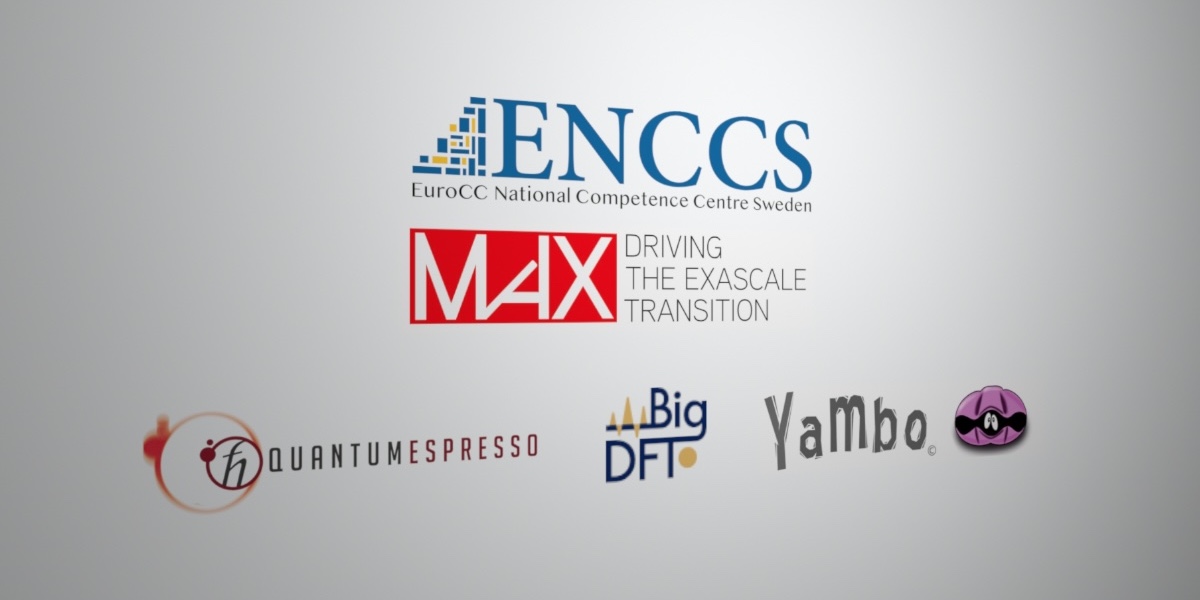
- This event has passed.
Efficient materials modelling on HPC with QUANTUM ESPRESSO, Yambo and BigDFT
14 Nov 2022 • 09:00 - 17 Nov 2022 • 13:00 CET
Free
Overview
In recent years, computing technologies underlying materials modelling and electronic structure calculation have evolved rapidly. High-performance computing (HPC) is transitioning from petascale to exascale, while individual compute nodes are increasingly based on heterogeneous architectures that every year become more diversified due to different vendor choices. In this environment, electronic structure codes also have to evolve fast in order to adapt to new hardware facilities. Nowadays, state-of-the-art electronic structure codes based on modern density functional theory (DFT) methods allow treating realistic molecular systems with a very high accuracy. However, due to the increased complexity of the codes, some extra skills are required from users in order to fully exploit their potential. This workshop will give a broad overview of important fundamental concepts for molecular and materials modelling on HPC, with a focus on three of the most modern codes for electronic structure calculations (QUANTUM ESPRESSO, Yambo and BigDFT). Theory sections will be interleaved with practical demonstrations and hands-on exercises where participants will put their new knowledge to the test on the Vega EuroHPC JU supercomputer.
QUANTUM ESPRESSO is one of the most popular suites of computer codes for electronic-structure calculations and materials modelling at the nanoscale, based on density-functional theory, plane waves, and pseudopotentials. It is able to predict and give fundamental insights about many properties of materials, molecular systems, micro and nanodevices, biological systems, in many fields, providing a huge amount of data for data-driven science applications.
YAMBO is an open-source code implementing first-principles methods based on Green’s function (GF) theory to describe excited-state properties of realistic materials. These methods include the GW approximation, the Bethe Salpeter equation, nonequilibrium GF (NEGF) and TDDFT, allowing for the prediction of accurate quasiparticle energies (e.g. ARPES band structures), linear and non-linear optical properties, capturing the physics of excitons, plasmons, and magnons. It is also possible to calculate temperature-dependent electronic and optical properties via electron-phonon coupling and nonequilibrium and non-linear optical properties via NEGF real-time simulations (pump-probe experiments, etc).
BigDFT is an open source density functional theory code which uses a Daubechies wavelet basis set which facilitates optimal features of flexibility, performance and precision. In addition to the traditional cubic-scaling DFT approach, BigDFT also contains an approach which scales linearly with the number of atoms, enabling DFT calculations of large systems containing many thousands of atoms which were impractical to simulate even very recently. BigDFT consists of a package suite with a wide variety of features, from ground-state quantities to excited state quantities based on time-dependent DFT and constrained DFT, to potential energy surface exploration techniques. It uses dual space Gaussian type norm-conserving pseudopotentials including those with non-linear core corrections, which have proven to deliver all-electron precision. Its flexible Poisson solver can handle a number of different boundary conditions including free, wire, surface, and fully periodic, while it is also possible to simulate implicit solvents as well as external electric fields. Finally, BigDFT has been designed to exploit HPC from the outset, with a hybrid MPI/OpenMP approach, as well as efficient exploitation of GPUs for hybrid functional calculations.
MAX (MAterials design at the eXascale) is a European Centre of Excellence which enables materials modelling, simulations, discovery and design at the frontiers of the current and future High-Performance Computing (HPC), High Throughput Computing (HTC) and data analytics technologies. MaX’s challenge lies in bringing the most successful and widely used open-source, community codes in quantum simulations of materials towards exascale and extreme scaling performance and make them available for a large and growing base of researchers in the materials' domain.
What you will learn
In this workshop, participants will learn how to launch the most common types of calculations (e.g. scf, phonons, quasi-particle energies, time-dependent properties) using QE, Yambo and BigDFT, how to prepare input files and how to read output files in order to extract the desired properties.
Best practices for efficient exploitation of HPC resources will be discussed, with particular emphasis on how to use the different schemes of data distribution (e.g. plane waves, pools, images) in combination with the different parallelization and acceleration schemes (MPI, OpenMP, GPU-offload) available in QE.
Prerequisites
This workshop is aimed towards researchers and engineers who already have some previous experience with materials modelling and electronic structure calculations:
- Some familiarity with density functional theory (DFT), self-consistent field (SCF) calculations and plane wave basis sets is desirable as the workshop will not cover the fundamental theory of these topics.
- Familiarity with working in a Linux environment and some experience with working on an HPC system is needed to participate in the hands-on exercises.
Tentative agenda
Nov 14 - QUANTUM ESPRESSO (pwscf)
[ninja_tables id="17595"]
Nov 15 - QUANTUM ESPRESSO (linear response) and AiiDA
[ninja_tables id="17596"]
Nov 16 - Yambo
[ninja_tables id="17597"]
Nov 17 - BigDFT
[ninja_tables id="17598"]
Registration
Registration is now closed.
For questions regarding this event please contact us at training@enccs.se.
------------
This training is intended for users established in the European Union or a country associated with Horizon 2020. You can read more about the countries associated with Horizon2020 here https://ec.europa.eu/info/research-and-innovation/statistics/framework-programme-facts-and-figures/horizon-2020-country-profiles_en







